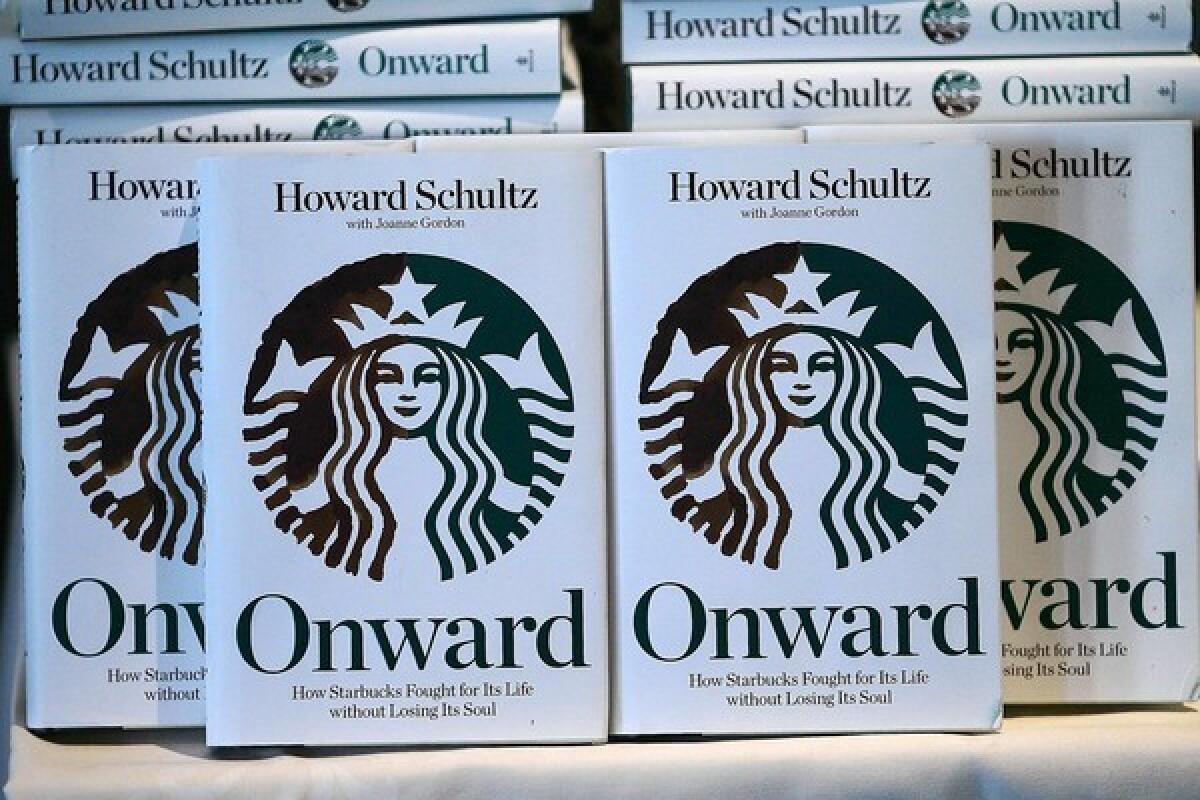Book review: ‘Onward: How Starbucks Fought for Its Life Without Losing Its Soul’ by Howard Schultz

Howard Schultz’s second self-flattering memoir about running Starbucks Corp., “Onward: How Starbucks Fought for Its Life Without Losing Its Soul,” will be required reading for a small circle of people: those who might hope to succeed him as chief executive of the $10.7-billion-a-year coffeehouse chain.
For while Schultz constantly tells the reader how much he cares about Starbucks’ 137,000 employees, his treatment of Jim Donald — who served as chief executive for the latter part of a seven-year period during which Schultz gave up the top job but remained on the premises as an active chairman — comes off as appalling.
In 2007, Schultz decides Starbucks has overemphasized new store openings and is forsaking barista training and other quality-control efforts. And he doesn’t like the breakfast sandwiches smelling up the shops. But rather than huddle up with Donald and help craft a solution, he begins back-channel talks with both Donald’s underlings and the company’s board of directors. “I did not want to undermine Jim,” Schultz says, explaining his silence at executive meetings, though undermine him he did. If Schultz confronted Donald in person repeatedly about his concerns, we don’t learn of that in “Onward.” Rather, Schultz wrote a scathing memo titled “The Commoditization of the Starbucks Experience,” sent it to Donald and other executives and then tells us he is stunned when the memo is leaked to the press.
“I worried that Jim may have felt personally attacked, as if I had publicly reviewed his job performance.” Eddie Haskell couldn’t have said it any better.
Donald, a former Wal-Mart executive, is kept in the dark about his impending ouster until the weekend before an elaborately orchestrated January 2008 announcement that Schultz is returning as CEO. Donald was summoned to Schultz’s house. “I cannot recall the exact words I spoke to Jim before he looked at me with what I perceived as disappointment and surprise, accepted several legal documents that had been prepared for him, and left my house.” Donald, of course, was well paid for his time at Starbucks, but the episode — and, indeed, much of the book — reveals a penchant on Schultz’s part to create drama and place himself in the middle of it. He didn’t just want Starbucks’ problems fixed, one surmises; he wanted to be the one who fixed them.
There was plenty to do. Store managers had been given so little information that they didn’t know whether their outlets were profitable or losing money. “Inventory was haphazard. Floors and tables were often dirty,” Schultz learns in mid-2008. Stores ran out of items because Starbucks’ supply operation was a mess. And costs had ballooned.
Schultz essentially did what McDonald’s had done beginning in 2003: slam the brakes on growth and improve cleanliness, service and operations at existing stores. Goaded at times by Starbucks’ board to act more aggressively, Schultz closed hundreds of stores, laid off thousands of workers and cut annual costs by close to $600 million. The smelly sandwiches were banned until they could be re-engineered not to overwhelm the coffee aroma. And store managers got laptops and access to performance information.
With an improving economy, sales at each store, which had been falling, began to rise again. Starbucks’ stock market value, which had fallen to little more than $7 billion, came roaring back and is now above $25 billion. Schultz’s personal stake is valued at about $700 million.
Joanne Gordon, a former Forbes writer, wrote “Onward” with Schultz. And while she says she had “unfettered access” to Starbucks’ employees, the book is really like a memoir — nearly every bit of information comes to us as Schultz discovers it and emotes about it. “My heart sank.” “Nostalgia washed over me.” “I was simply exhausted. Physically and emotionally.” The mostly perfunctory account of Starbucks’ actual problems and Schultz’s steps to fix things makes such statements seem overwrought. An outsider’s account could be more compelling.
For instance, Schultz tells us that near the low point after his return as CEO, a big investor calls and tells him to cut Starbucks’ well-publicized health coverage for part-timers. “You’ve got all the cover and license in the world,” the investor says. “Everyone will understand you had no choice.”
Schultz refuses, noting the “reservoir of trust” with workers he’d lose if he axed the coverage, which he says cost Starbucks $250 million in 2009.
An independent author, however, would have gotten to the bottom of the health insurance claims. Even a casual Googler finds a lively and troubling online debate at Starbucks-related Web sites over whether store managers intentionally limit workers hours to less than 20 weekly to deny them eligibility. And though Starbucks employs 107,000 in the U.S., Schultz brags vaguely that “we extended health-care coverage to thousands of part-time workers.”
Bailey is a former reporter for the Wall Street Journal, the New York Times and the Los Angeles Times.
More to Read
Sign up for our Book Club newsletter
Get the latest news, events and more from the Los Angeles Times Book Club, and help us get L.A. reading and talking.
You may occasionally receive promotional content from the Los Angeles Times.








